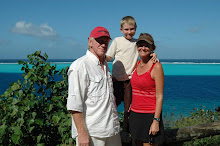 | |
| School at Viani Bay |
Many of the Fijian islands support small primary schools for the local village kids. The Fijian government promotes and funds education, yet the schools are primitive (by American standards) and resources are limited. We have had the opportunity to visit several schools in Fiji and found the children well-behaved and the teachers kind and organized. It is an uplifting experience and they are always so grateful for any school supplies we give them.
 | |
| The local "school bus" |
Viani Bay is home to one such school that currently educates 56 kids from the local area. There is no village here but lands owned by an extended family. Jack, our dive guide for the past week, is a member of this family and is highly involved with the success of the school, which his grandchildren attend. Last week, the school ran out of funds and the family needed to purchase fuel for “busboat” that shuttles the students to school. So this week, Jack organized a lovu feast for the "yachties" (as he calls people on the boats) and charged $20 per boat to raise money for the school. (A lovu is a method of cooking in a heated pit. Fish, chicken and root vegetables are buried in banana leaves earlier in the day and uncovered several hours later to reveal a succulent feast.) Nine boats participated for a wonderfully orchestrated, impromptu feast.
School let out at 3pm, after which the kids played games for an hour. Jack invited the kids from the boats to come in to participate and the feast would follow. Our kids had a tough time keeping up playing soccer in the heat of the afternoon with highly skilled players! But they had a blast!
 | |
| Fijian food |
All gathered around to watch as the men dug the food from the ground. The rich smells of roasted chicken mingled with the strong char smell of the fire. Banana leaves were peeled back to reveal the steamy meal and our mouths watered in anticipation. The food was served to us on plates woven from palm fronds while we sat in chairs brought from the classrooms to the waterfront especially for us. (The local people sat on mats on the ground, as is their custom). There was fresh fish, freshwater prawns, chicken, taro root and kasava (think dry yams), breadfruit (again, yam-like), a green leaf (like spinach) cooked in coconut milk, and fresh fruit (papaya, pineapple and bananas) for dessert. Delicious fresh coconut water, still in the nut, was the beverage. We were all pleasantly surprised by the excellent quality of the food (in comparison to another lovu we attended where the main dishes were a variety Ramen noodles with canned meat!).
 | |
| Eric drinks kava |
After dinner, the men set up a kava bowl on a separate mat and invited all to join in. Sitting around a kava bowl is like sitting at a bar. Everyone tells stories, throws back a shot (half coconut shell) of intoxicating liquid, and enjoys each other’s company. Oftentimes, there will be singing and hearty laughter. It is the main social entertainment, particularly for the Fijian men. Eric likes to partake in this ritual whenever he can.
It was all very inviting and friendly – and real. We learned later that funds were collected from all present, not just the yachties, and $460 was raised. We all felt good about that.

